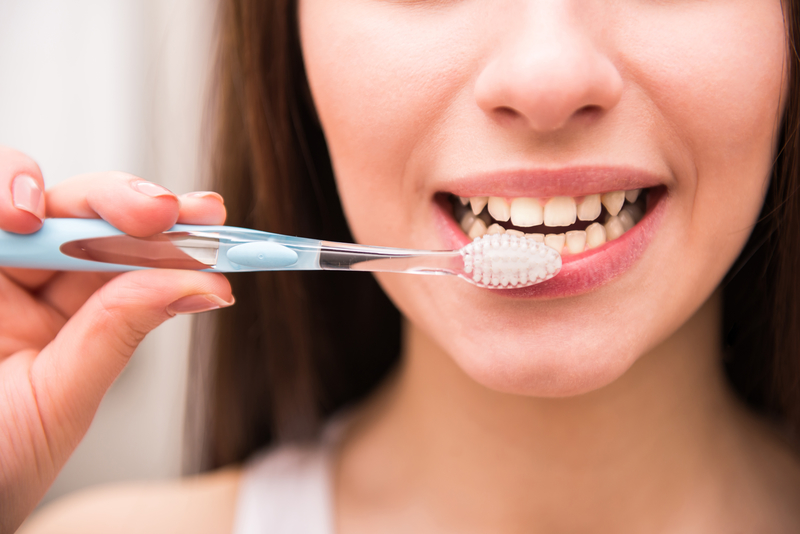What’s the first thing you think of when you think of good oral hygiene? For most of us, it’s brushing our teeth! This daily ritual has become the epitome of good oral health maintenance. After all, many dentists recommend brushing at least twice daily for healthy teeth and gums! However, these days there are a number of commercials and advertisements dedicated to telling us which toothpastes and brushes to use to maximize cleanliness.
The wide variety of options available can sometimes be a bit overwhelming! After all, long gone are the simple days of using mere baking soda like our parents or grandparents. But with all of these choices at our fingertips, how can we be sure that we’re making the right one, especially when it comes to our toothpaste? Does flavoring matter? Are certain brands better than others? To save some confusion (and hopefully money, too!) below is a list of some important things to consider when purchasing toothpastes for a brighter, whiter, and healthier smile!
Pearly Perfection
There are a number of toothpastes on the market which claim to be particularly effective at eliminating tooth discoloration and turning yellow teeth into sparkling, pearly whites. However, sometimes advertising can be misleading. Most so-called whitening toothpastes contain mild abrasives which help remove the buildup of additional stains from the teeth, but they don’t necessarily improve the overall discoloration. According to Dr. Augusto Robles, director of operative dentistry at the University of Alabama, the best choice toothpastes for teeth whitening contain modified silicone abrasives. But if those don’t produce the desired results after a month of usage most dental offices offer in-house treatments to get rid of discoloration.
Sensitive Solutions
Sensitive teeth and/or gums? No problem! Some of us struggle with sensitivity even without cavities or root infections. In some cases, sensitivity may be the result of brushing too roughly. After all, we don’t need to be overly forceful when brushing our teeth! Instead, let the brush itself and the toothpaste do their jobs, without being abrasive while brushing. However, sometimes sensitivity just comes naturally, and isn’t necessarily a sign of poor flossing or brushing habits. Some of us may even suffer from exposed roots, which can make the need to brush a scary one! For sensitive smiles, Dr. Sally Cram, a Washington, D.C.-based periodontist recommends desensitizing toothpastes, such as those which contain the ingredients potassium nitrate or strontium chloride. Both are equally effective at helping lessen the pain of teeth brushing, and the ADA has approved their use in several brands of toothpaste.
Cavity Calamity
Our mouths are full of special bacteria which aid in breaking down foods and protecting us from certain invading organisms. However, not all bacteria is good bacteria. In fact, everyday a type of bacteria called plaque tries to cling to our teeth. This bacteria interacts with certain foods, especially sugars, to create acids which eat away at our tooth enamel! This wearing process results in tiny holes which we call cavities. The best solution for this problem, as recommended by the ADA and dentists everywhere, is the mineral fluoride. Fluoride is essentially nature’s cavity fighter. Luckily, these days most toothpastes on the market contain fluoride as one of their primary ingredients. That being said, any product endorsed by the ADA as being anti-cavity is a great choice for patients, particularly those who are more susceptible to cavity formation. Just be sure to give your teeth enough time during brushing to be properly cleaned. Dr. Robles also recommends that brushing and spitting, but not rinsing immediately, can help the fluoride to do its job by giving it more time to work.
Dazzling Dentures
But what about those of us who wear dentures? What is the best method for cleaning teeth when they’re not entirely our own? Luckily, almost any regular toothpaste can be effective for cleaning dentures. Much like natural teeth, dentures require regular, gentle brushing to maintain cleanliness and hygiene. However, some dentists recommend effervescent tablets as an even more effective alternative to good old toothpaste. There are many ADA-approved brands of denture-cleaning tablets, all of which work by soaking the dentures over a period of time (usually overnight) to eliminate bacteria buildup and reduce discoloration.
Tackling Tartar
Also referred to by dentists as “calculus,” tartar is essentially bacterial plaque which has hardened. Once tartar has formed, no amount of brushing can get it off, which is why most dentists employ the help of a little pick to help scrape the substance off of our teeth. However, it should be known that certain toothpastes contain ingredients which can help prevent tartar-buildup in the first place. Such ingredients include pyrophosphates and zinc citrate. Employing toothpastes with these helpful ingredients can reduce the amount of tartar which builds up on our teeth, not only improving our overall oral health, but also resulting in less discomfort in future dental visits.


Add Comment